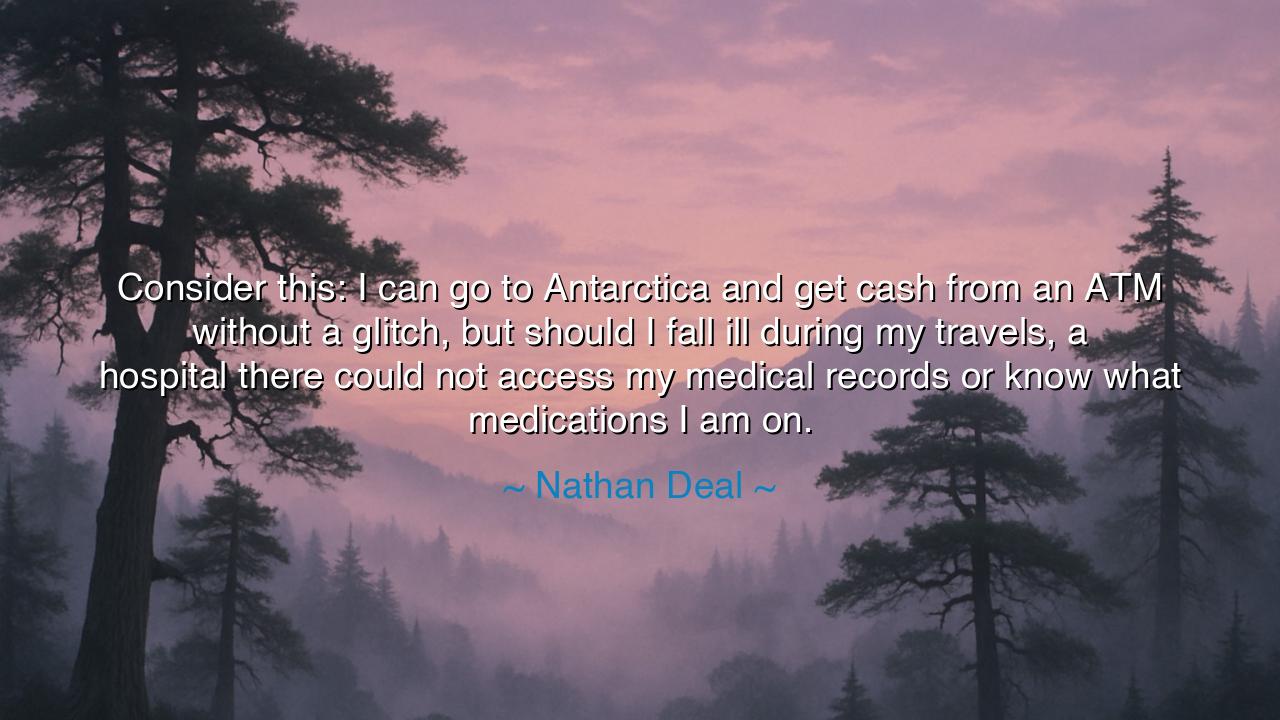
Consider this: I can go to Antarctica and get cash from an ATM
Consider this: I can go to Antarctica and get cash from an ATM without a glitch, but should I fall ill during my travels, a hospital there could not access my medical records or know what medications I am on.






Hear, O seekers of truth, the words of Nathan Deal, who proclaimed: “Consider this: I can go to Antarctica and get cash from an ATM without a glitch, but should I fall ill during my travels, a hospital there could not access my medical records or know what medications I am on.” These words are not idle complaint, but a lamentation and a warning, for they unveil the imbalance of our age: that commerce is woven into a seamless net across the world, while the sacred duty of healing lags behind in shadows and disorder.
The origin of this quote lies in the struggle to modernize healthcare in an age of technology. Banks and markets, driven by profit, built networks so vast and so precise that even on the frozen edge of the earth one may summon wealth with a mere card. Yet the systems of medicine, which ought to serve life itself, remain fragmented, bound by borders, and hindered by divisions of language, law, and institution. Deal’s words strike at the heart: mankind has mastered the art of exchanging money, but not the art of sharing the knowledge that could save a life.
This paradox has long haunted humanity. Consider the sailors of the Age of Exploration: they could carry gold across oceans, but they could not carry with them the wisdom to cure scurvy. The price was measured in lives, not in coins. Or consider soldiers on distant battlefields, supplied with weapons and rations across continents, yet denied access to the records of their own health. Time and again, the march of progress in trade has outpaced the march of progress in care. Deal’s lament is the modern echo of this ancient imbalance.
And yet, his words are also a call to vision. Imagine a world where the healer in Antarctica, in Africa, or in Asia could open a single tablet of knowledge and see at once the patient’s needs, allergies, and medicines. Imagine if the flow of healing knowledge moved with the same ease as the flow of currency. Such a world would honor life above profit, dignity above convenience. It would be a step toward the ancient dream of a brotherhood of man, where borders no longer divide compassion.
The lesson here is twofold. First, that we must not mistake technological progress in one field for progress in all. The gleaming power of global commerce can deceive us into believing we live in an age of universal advancement, when in truth our moral priorities remain skewed. Second, that true civilization is not measured by how swiftly we can withdraw cash, but by how swiftly we can extend a hand of healing to the sick.
History offers examples of societies that understood this balance. In ancient Egypt, physicians were revered as highly as priests, and their records of healing were preserved with care. In China, emperors supported vast systems of herbal medicine that crossed provinces and dynasties. These civilizations knew: wealth without health is hollow. But when the two walk together, a nation is both strong and humane.
Therefore, O listeners, let your actions be clear: demand of your leaders a system where medical records are as portable and accessible as money, where the art of healing is granted the same priority as the art of buying. Support innovations that unite health with technology, and honor those who labor to bring order to the chaos of fragmented systems. And in your own life, carry your knowledge—your history of medicines, your health—in ways that protect you, for until the greater system is built, you must be your own keeper.
Thus let Deal’s words endure: “I can go to Antarctica and get cash from an ATM, but a hospital could not access my medical records.” For this is the cry of an age that must reorder its values. Let money flow where it will, but let the lifeblood of knowledge flow further still—so that no man or woman, at the ends of the earth, will perish for want of information that could have been shared.






AAdministratorAdministrator
Welcome, honored guests. Please leave a comment, we will respond soon